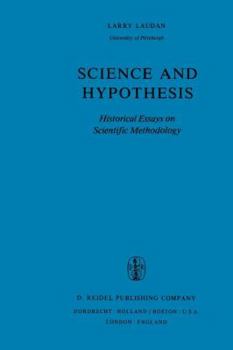Science and Hypothesis: Historical Essays on Scientific Methodology
Select Format
Select Condition 
Book Overview
This book consists of a collection of essays written between 1965 and 1981. Some have been published elsewhere; others appear here for the first time. Although dealing with different figures and... This description may be from another edition of this product.
Format:Paperback
Language:English
ISBN:9048183677
ISBN13:9789048183678
Release Date:October 2010
Publisher:Springer
Length:260 Pages
Weight:0.81 lbs.
Dimensions:0.6" x 6.0" x 9.0"
Customer Reviews
1 rating
Philosophy of science as a product of science
Published by Thriftbooks.com User , 16 years ago
Laudan's overreaching thesis is that classical philosophy of science was always subordinated to actual science: "New or innovative methodological ideas have generally not emerged, nor have old one been abandoned, as the result of internal, dialectical counterpoint between rival philosophical positions or schools; neither is it the case that the waxing and waning of methodological doctrines can be related neatly to their epistemic credentials. Rather, it is shifting _scientific_ beliefs which have been chiefly responsible for the major doctrinal shifts within the philosophy of science." (p. 9). Laudan is thus rightly furious with philosophers who "set out to tell the history of the philosophy of science by asking the question: what have the great philosophers said about science?" (p. 1). Indeed Laudan successfully refutes many idiotic misconceptions of such ignoramuses, and he does so with considerable zeal. The must amusing case is the misguided reverence for "Hume's problem of induction." It will come as no surprise to anyone but self-absorbed philosophers that "one of the core problems in medieval, renaissance and early 17th-century epistemology was precisely this: to what degree, if at all, does a confirming instance of a theory contribute to the cognitive well-foundedness of that theory?" (p. 77). The contribution of Hume---"that dour scientific dilettante" with "almost unparallelled ignorance of the science of his day" (p. 83)---was to trivialise this important problem to childish instances such as "how do I know that this bread which nourished me today will nourish me tomorrow" (p. 75). "It is one of the wilder travesties of our age that we have allowed the myth to develop that 19th-century philosophers were as preoccupied with Hume as we are. As far as I have been able to determine, none of the classic figures of 19th-century methodology---neither Comte, Herschel, Whewell, Bernard, Mill, Jevons, nor Pierce---regard Hume's arguments about induction as much more than the musings of an historian. This claim is borne out by the fact that in Pierce's thirty-two papers on induction and scientific method---papers teeming with historical references---there is only one reference to Hume; and that is not in connection with the problem of induction but with the problem of miracles." (p. 240). Another case of misguided reverence which Laudan corrects is that of Galileo. The revolution in scientific methodology was prompted by "the radical observational inaccessibility of the entities postulated by their theories," which was "one of the most persistent, and philosophically disturbing, features of most sciences of the 17th century" (p. 22). Meanwhile, "Galilean mechanics could be (and sometimes was) regarded as posing no acute threat to the theory of scientific methodology advocated (say) in Aristotle's Posterior Analytics. If the whole of 17th-century science had exhibited the largely phenomenological character of Galileo's mechanics, there need have






